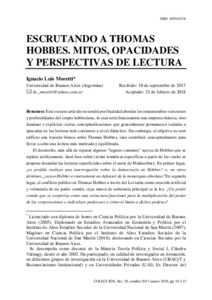Por favor, use este identificador para citar o enlazar este ítem:
https://repositorio.uca.edu.ar/handle/123456789/7108| Título: | Escrutando a Thomas Hobbes : mitos, opacidades y perspectivas de lectura | Autor: | Moretti, Ignacio Luis | Palabras clave: | POLITICA; DEMOCRACIA; FILOSOFIA POLITICA; PENSAMIENTO POLITICO; Hobbes, Thomas, 1588-1679 | Fecha de publicación: | 2018 | Editorial: | Pontificia Universidad Católica Argentina. Facultad de Ciencias Sociales. Departamente de Ciencias Políticas y Relaciones Internacionales | Cita: | Moretti, I. L. Escrutando a Thomas Hobbes : mitos, opacidades y perspectivas de lectura [en linea]. Colección. 2018, 23(28). Disponible en: https://repositorio.uca.edu.ar/handle/123456789/7108 | Resumen: | Resumen: Este escueto artículo no tendrá por finalidad abordar los innumerables vericuetos y profundidades del corpus hobbesiano, lo cual sería francamente una empresa titánica, sino iluminar y explicitar ciertas conceptualizaciones que generalmente permanecen vedadas u opacadas en las lecturas más corrientes a nivel didáctico. Sin embargo, el objetivo no será edificar una leyenda blanca sobre Thomas Hobbes, sino contribuir conceptualmente para llevar a cabo una lectura más matizada y equilibrada. El desarrollo, más allá de repasar algunos “lugares comunes” acerca de Hobbes que se repiten acríticamente, hará foco sobre ciertas temáticas específicas a partir de las cuales se propone desandar las lecturas superficiales sobre el autor de Malmesbury. En primer lugar, ¿es posible realizar una interrogación sobre la democracia en Hobbes? o, en otros términos, ¿acaso Hobbes es meramente un defensor de la monarquía absoluta? En segundo lugar, el conflicto político en Thomas Hobbes a través del Leviatán como creación artificial y voluntaria de un poder común, cuya marca de soberanía principal es la ley. ¿Un poder común que se corporiza como una estructura funcional para la multiplicación del poder de las corporaciones e individuos poderosos o cómo el límite a dichos poderes? Abstract: This brief article will not aim to address the innumerable intricacies and depths of the Hobbesian corpus, which would be frankly a titanic undertaking, but to illuminate and make explicit certain conceptualizations that generally remain closed or obscured in the most common readings at the didactic level. However, the objective will not be to build a white legend about Thomas Hobbes, but to contribute conceptually to carry out a more nuanced and balanced reading. The development, beyond reviewing some "common places" about Hobbes that are repeated uncritically, will focus on certain specific themes from which it is proposed to retrace the superficial readings on the author of Malmesbury: First, is it possible to conduct a question about democracy in Hobbes? Or, in other terms, is Hobbes merely a defender of the absolute monarchy? Secondly, the political conflict in Thomas Hobbes through the Leviathan as an artificial and voluntary creation of a common power, whose main sovereign mark is the law. A common power that is embodied as a functional structure for the multiplication of the power of corporations and powerful individuals or how the limit to such powers? |
URI: | https://repositorio.uca.edu.ar/handle/123456789/7108 | ISSN: | 1850-003X (en línea) 0328-7998 (impreso) |
Disciplina: | CIENCIA POLITICA | Derechos: | Acceso Abierto | Fuente: | Colección. 2018, 23(28) |
| Aparece en las colecciones: | COL - 2018 Año XXIII nro. 28 |
Ficheros en este ítem:
| Fichero | Descripción | Tamaño | Formato | |
|---|---|---|---|---|
| 1034-3484-1-PB.pdf | 176,21 kB | Adobe PDF |  Visualizar/Abrir |
Visualizaciones de página(s)
437
comprobado en 30-abr-2024
Descarga(s)
484
comprobado en 30-abr-2024
Google ScholarTM
Ver en Google Scholar
Este ítem está sujeto a una Licencia Creative Commons

